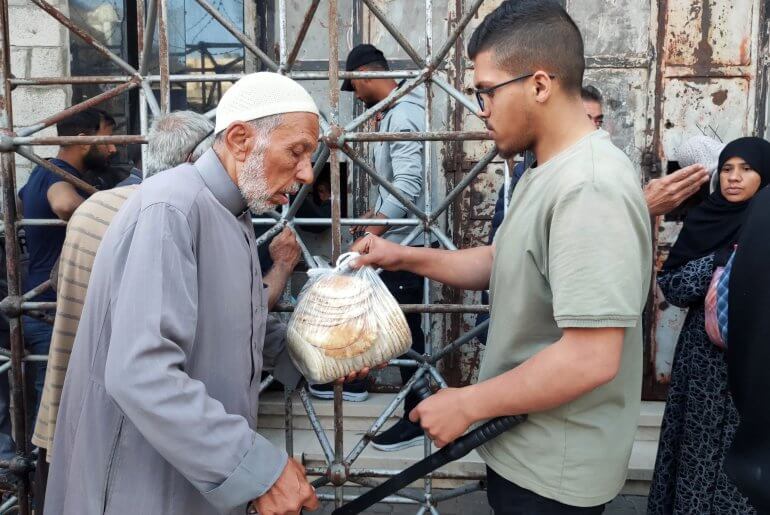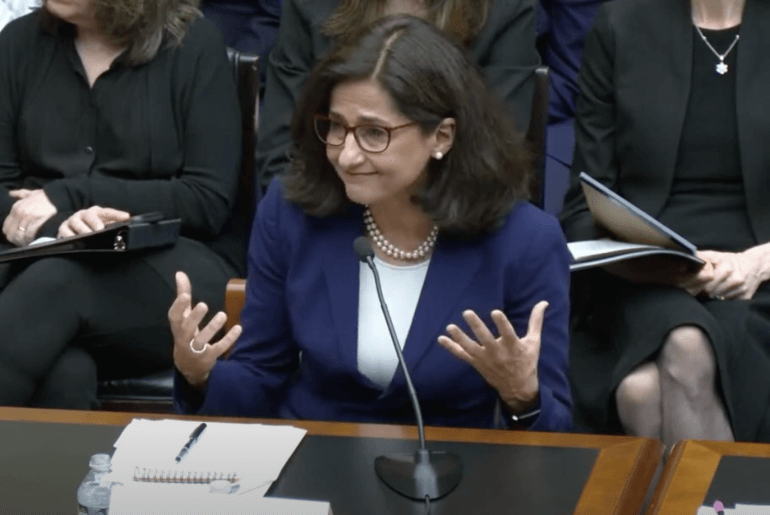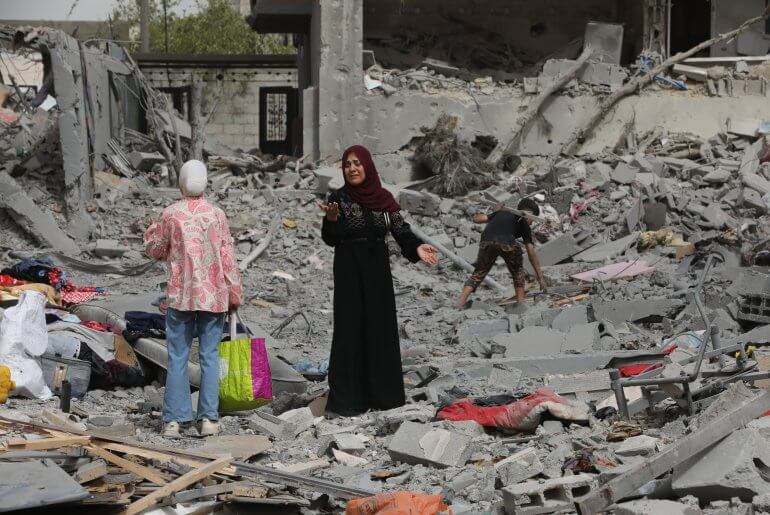The Palestinian olive harvest is a sacred ritual cherished by Palestinians from all walks of life.
But every year, the beauty of the olive harvest is inevitably marred by violence and bloodshed as Israeli settlers wage vicious attacks against Palestinian farmers across the occupied West Bank.
We traveled to the Nablus district in the northern occupied West Bank, which is home to dozens of rural Palestinian villages, like the town of Burin, which is surrounded by a number of illegal Israeli settlements.
The Israeli settlers in the Nablus district are notoriously violent and are routinely recorded as attacking Palestinians and their property year round. But once the olive harvest comes around every year, the Israeli settlers typically focus their attacks onto Palestinian farmers and their olive trees.
“The settlers keep a look out for the [Palestinian] farmers when they’re alone, they’re on the lookout so they can go and steal the [farmers’] crops,” local activist Ayman Gharib told Mondoweiss.
“It is a tragedy that for the whole year, the farmer is preparing his crops, watering his trees, and caring for them, and doing all of this work, and at the end a settler comes here comfortably and steals the olives, and flees back to the settlement,” Gharib said, pointing up towards the hilltop on the outskirts of Burin, where an illegal settlement sits.
“The settler is always armed, and is always protected by the army,” he said.
After years of witnessing settler violence in their towns, Gharib and other activists decided to form a group of volunteers under the name ‘Faz3a’, who accompany Palestinian olive farmers to their lands to help them pick the olives and defend them in the case of settler attacks.
“We will defend every grain of soil on these mountains. We will reach these olive trees and reach all the olive trees in Palestine,” Gharib said. And we will harvest every piece of olive and give it to the farmers.”
“We will defend ourselves with all of our might. We are ready to pay the price. To pay the price, as Palestinian people, we are ready. From getting arrested, getting shot, tear gassed, all forms of suppression, destruction, and terrorism, we are used to it,” Gharib said.
Just days after the olive harvest began this year the Faz3a group was called to the site of a violent attack on a group of Palestinian farmers in the nearby town of Huwwara.
We traveled to the site of the attack, where a group of locals were picking their olives. They told us not to get any closer to that hilltop for fear that the settlers would come down and attack them again.
Just one day before, after a group of Palestinian farmers came to pick their olive trees, a group of armed Israeli settlers descended from the hilltop and immediately began attacking the farmers and burning down their crops.
“In the beginning there were 20 of them [settlers], then they became 30, and then 40,” a worn down Sabe’ Odeh, the victim of the settler attack in Huwwara told Mondoweiss outside his home.
“The occupation soldiers were shooting at me. They shot tear gas, sound bombs, to us. They shot [at us] because we told them ‘don’t let the settlers throw stones at us’. Why were they throwing stones at us?” he asked.
Pointing to his telephone screen as he scrolled through footage of the attack, Odeh pointed to the masked settlers as they held up a huge rock, just moments before throwing it down at him.
“The rock was heavier than 5 or 6 kilos.They [settlers] were hitting me with it when I was on the ground,” he said.
“I have an injury here,” he said, pointing to his arm. “I have an injury on my leg. I have an injury on my forearm, I have one on my hand, on my back, and on my head.”
“My only offence was that I wanted to go to my land, the land that my father and my grandfather once farmed,” Odeh said.
Rights groups say that the Israeli settlers are motivated by ultranationalist and right wing causes and believe that they have a right to stake claim to the land of the West Bank by all means, including violence.
More often than not, the settlers are armed and operate under the full protection of the Israeli military,
“The Israeli army, unfortunately, the occupation is the one who gives them [settlers] the greenlight to attack us, and beat us, and break us, even until death,” Odeh told Mondoweiss.
“Yesterday they [settlers] attacked me. God, praises to him, saved me from their hands. Or else they would have killed me.”
“We are not criminals,” Odeh continued. “We only want to go pick our olives. Pick the olives for our children. This is what happens everyday in Palestine on all the land of the Palestinian people.”
Despite the constant threat of violence that they face Palestinain farmers and activists say that there’s nothing in the world, not even the chance of death, that could keep them from picking their olives, or prevent them from keeping alive the tradition of the Palestinian olive harvest.
“We are ready for all the scenarios of life. We are on this land, and we are not going to leave it. We are staying on this land, we are not changing, we will not exchange it.” Gharib told Mondoweiss.
“Any generation that grows up [here] knows that this is his land, this is our home, this is our land, from our forefathers.”
Odeh told Mondoweiss that his message to the world, was “if you don’t accept oppression for yourselves then you should not accept my oppression.”



I am an olive farmer in Spain. Picking my olives in the warm November sunshine, listening to the visiting robin chastising me for disturbing his territory, is the high point of my year. The olive is a beautiful tree, and has been known as a sign of peace since Biblical times.
This story is so sad. I am writing this with tears in my eyes. These settlers seem to have lost their humanity. How can it be restored?
For the record:
1 of 2
Europeans visited the Holy Land regularly & their diaries provide a portrait of Palestine before the arrival of foreign Zionists. As far back as 1615, the English poet George Sandys found it “a land that flowed with milk & honey; in the midst as it were of the habitable world, & under a temperate clime; adorned with beautiful mountains and luxurious valleys; the rocks producing excellent waters; and no part empty of delight or profit.”
According to Englishwoman Lady Hester Stanhope who was in Palestine in 1810, “The luxuriance of vegetation is not to be described….Fruits of all sorts from the banana to the blackberry are abundant. The banks of the rivers are clothed naturally with oleander & flowering shrubs….[The Arab orchards near Jaffa] contained lemon, orange, almond, peach, apple, pomegranate & other trees.”
The American missionary, William Thompson, visited all the areas of Palestine between 1832 and 1876 & discovered rich agricultural development throughout the land. Outside Bethlehem, he viewed “the greenery of wheat.” Approaching Ramallah, he found “vineyards covering the surrounding hills which were filled with figs & olives, while apples, pomegranates & other fruits were abundant,….. near Jenin the soil is planted with cucumber, melons & maize,”….towards Acre he crossed “the green expanse of meadows;” in the Galilee, he found “olive groves.” (The Land and the Book, pp. 24, 107.166, 251,303)
Sir Moses Montefiore, who travelled to Palestine in 1839 to look for agricultural lands to acquire, described the eastern Galilee as covered with “groves of olive trees, I should think more than five hundred years old, vineyards, much pasture, plenty of wells & abundant excellent water; also fig trees, walnuts, almonds, mulberries etc., & rich fields of wheat, barley and lentils.” In the area around Djaouna he found “the highest of cultivation….the inhabitants were good farmers & possessed horses, cows, sheep & goats in great abundance.” [Diaries of Sir Moses and Lady Montefiore. p.169,175-176.]
2 of 3
While visiting Palestine in 1883, Englishman Laurence Oliphant described the Plain of Esdraelon at Acre as being “…in a high state of cultivation. It looks today like a huge green lake of waving wheat, with its village-crowned mounds rising from it like islands and it presents one of the most striking pictures of luxurious fertility which it is possible to conceive.” (ibid)
The main source of wealth for all Palestinians was the abundance of food produced on the fertile coastal plain that stretched from Gaza in the south to Acre in the north. For centuries, the country’s principle export was its enormous crop of world famous citrus and other fruits from the orchards near Jaffa. The legendary Jaffa orange resulted from an innovated grafting technique devised by Palestinian orchardists. Jaffa oranges were of such high quality that in 1856, Henry Gillman, the American consul in Jerusalem, suggested that Florida citrus growers would improve their crops by studying and adopting Palestinian grafting techniques. “The volume of the 1880 harvest was 36 million oranges.” (British report on Palestinian agriculture, Parliamentary Papers, 1881/xc Beyrout, 19.3 1881)
BTW, Netanyahu and his fellow Zionists have repeatedly trotted out the canard that during his visit to Palestine in the 1860’s Mark Twain (i.e., Samuel Clemens) criticized and dismissed Palestinian agriculture. Au contraire:
“Deniers also champion Mark Twain’s 1867 Innocents Abroad, always using the same passage, which describes Palestine in part as a ‘desolate country’ where Twain ‘never saw a human being on the whole route.’ But this 68-word mantra, presented as a single coherent opinion, selectively combines sentences and phrases from pages 488, 520 and 555 of the travelogue. Never mentioned are Twain’s half-dozen anecdotes about encounters with Arabs in Palestine. Innocents Abroad actually offers more support to the Palestinian narrative than the Zionist one.” (“The rhetoric of Palestine denial” by David Benkof, 2014)
3 of 3
The Zionist claim that Israel quickly and dramatically increased the amount of land under cultivation within its borders is another fabrication as is Shimon Peres’ assertion that such land was “redeemed from swamp and wilderness.” In fact, as of 1979, “About 80 percent, and probably more, of the 2,185,000 dunums ‘brought into cultivation’ [by Israel] since 1948 constitute farmland belonging to Palestinian refugees.” (Alan George, Making the Desert Bloom…” p. 99)
During the first three decades of Israel’s existence when it received a net import of capital totalling $31.5 billion (Maariv, 1 July 1977), excluding US taxpayers’ massive financial aid, and had the use of modern agricultural equipment as well as sophisticated farming techniques, its record of land cultivation was quite poor. “[T]he area within what became Israel actually being farmed by Arabs in 1947 was greater than the physical area which was under cultivation in Israel almost thirty years later…. The impressive expansion of Israel’s cultivated area since 1948 has been more apparent than real since it involved mainly the ‘reclamation’ of farmland belonging to the refugees; this is probably as true for the Negev desert as for the rest of Israel.” (Alan George, ibid)
The world turns, the sun rises and supremacist Israeli colonists do evil in not-Israel while Israeli Occupation, Colonization and Oppression Forces goons enable and defend them.
It’s just another day in the life of Zionism.